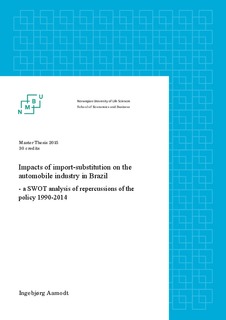| dc.contributor.author | Aamodt, Ingebjørg | |
| dc.date.accessioned | 2016-03-03T13:33:11Z | |
| dc.date.available | 2016-03-03T13:33:11Z | |
| dc.date.issued | 2016-03-03 | |
| dc.identifier.uri | http://hdl.handle.net/11250/2381308 | |
| dc.description.abstract | Import-substituting industrialization have been a policy that have been used in many
industries as to create a domestic as well as an autonomous industry. The Brazilian
automobile industry have used this type of enhancement several times through history With positive results. When the industry experienced foreign influences that created problems for the industry, the government again introduced import-substitution in 1995 and 2011. The use of import-substitution in today’s world crates more difficulties than in the 1950s. In what way will import-substitution contribute to enhance an already established industry and contribute to establish a domestic value chain, and how will the external impacts either help or harm the industry that is being protected. Additionally, when comparing internal and external influenced, which one overrules the others in support the success of the policy. Through a SWOT analysis it is possible to attain the internal and external influences, as well as divide what are characterized as strengths, weaknesses opportunities or threats. The measures in the automobile industry in Brazil have led to foreign subsidiaries enhancing productivity in the country, as well as increase investment in research and development that will led to a greater value chain within Brazil. Additionally, the use of local content requirement has led to increased use of Brazilian produced inputs in production. The agreement Brazil have made with fellow Mercosur members Argentina, Paraguay and Uruguay have established long-run export markets, as well as contributed to the establishment if a regional value chain in producing vehicles. External influences that are putting the industry in risk is recession that will lower demand for cars. In addition, an appreciation of the exchange rate will make Brazilian export less attractive on the international market, and increase the amount being mported. A prominent threat of introducing import-substitution in this time is how international trade is regulated by the WTO, which involves commitments that are signed
being a member, and how the measures included in import-substitution goes against these commitments. | nb_NO |
| dc.description.abstract | Import-substitusjon har vært en plan som har blitt brukt på mange industrier for å opprette en nasjonal- i tillegg til en selvstendig industri. Brasilianske myndigheter har brukt denne politikken flere ganger for å fremme bilindustrien. Da industrien opplevde eksterne påvirkninger som skapte problemer for industrien, introduserte myndighetene import-substitusjon igjen i 1995 og 2011. Bruken av import-substitusjon skaper flere problemer i dagens verden enn på 1950 tallet. På hvilken måte vil import-substitusjon bidra til å forsterke en allerede etablert industri og bidra til å etablere en nasjonal verdikjede, og hvordan vil eksterne påvirkninger enten hjelpe eller harme den beskyttede industrien. I tillegg til hvordan vil de eksterne og interne påvirkningene se ut når de blir satt opp mot hverandre for å vurdere politikken sin suksess. Gjennom en SWOT analyse er det mulig å finne de interne samt eksterne påvirkningene, samt å dele opp hva som klassifiseres som styrker, svakheter, muligheter eller trusler. Import-substitusjon har ført til en økning av utenlandske selskaper som har styrket sin produksjon i landet, i tillegg til at de har økt investering i forsking og utvikling, som vil føre til en styrking av den brasilianske verdikjeden. I tillegg har bruken av krav av lokalt innhold i produksjon ført til en økning av brasilianskprodusert innsatsfaktorer i produksjon. Avtalen Brasil har med andre medlemmer i Mercosur, Argentina, Paraguay og Uruguay har etablert eksportmarkeder i lang tid, i tillegg til å bidra med å etablere en regional verdikjede i å produsere biler i verdensdelen. Eksterne påvirkninger som er en risiko for industrien, er tider med lavkonjunktur vil synke etterspørselen etter biler. I tillegg, vil en appresiering av valutaen gjøre brasiliansk produserte biler mindre attraktive på det internasjonale markedet, i tillegg til å øke bilimporten. En fremtredende trussel ved å introdusere import-substitusjon er hvordan internasjonal handel er regulert av verdens handelsorganisasjon, som innebærer forpliktelser som er signert av medlemmer, og hvordan midlene involvert i import-substitusjon er i konflikt med disse forpliktelsene. | nb_NO |
| dc.language.iso | eng | nb_NO |
| dc.publisher | Norwegian University of Life Sciences, Ås | |
| dc.subject | Brazil | nb_NO |
| dc.subject | automobile industry | nb_NO |
| dc.subject | SWOT analysis | nb_NO |
| dc.subject | import-substitution | nb_NO |
| dc.subject | industrial policy | nb_NO |
| dc.subject | trade policy | nb_NO |
| dc.subject | domestic industry | nb_NO |
| dc.title | Impacts of import-substitution on the automobile industry in Brazil : a SWOT analysis of repercussions of the policy 1990-2014 | nb_NO |
| dc.title.alternative | Effekter av import-substitusjon på den brasilianske bilindustrien - en SWOT analyse av virkingene av politikken 1990-2014 | nb_NO |
| dc.type | Master thesis | nb_NO |
| dc.subject.nsi | VDP::Social science: 200::Economics: 210 | nb_NO |
| dc.source.pagenumber | 90 | nb_NO |
| dc.description.localcode | M-ØA | nb_NO |
